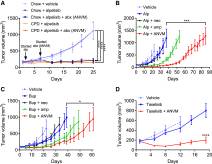
普林斯顿大学Joshua D. Rabinowitz研究组揭示了膳食植物化学物质的微生物代谢控制PI3K抑制剂的抗癌活性。该项研究成果发表在2025年5月19日出版的《细胞》上。
该研究组证实了饮食与PI3K的抗癌协同作用,但令人惊讶的是,它与饮食中的常量营养素成分无关。相反,饮食与PI3K的相互作用涉及摄入植物化学物质的微生物代谢。具体来说,小鼠生酮饮食缺乏标准食物中发现的复杂的植物化学物质,包括大豆植物化学物质大豆皂苷。研究人员发现大豆皂苷被微生物组转化为肝细胞色素P450酶的诱导剂,从而降低PI3K抑制剂的血液水平和抗癌活性。高碳水化合物、低植物化学物质的饮食与抑制PI3K协同作用,可以治疗小鼠的癌症,就像减少肠道微生物群的抗生素一样。因此,饮食通过植物化学-微生物组-肝脏相互作用影响抗癌药物的活性。
研究人员表示,磷脂酰肌醇3-激酶(PI3K)信号通路既是胰岛素的效应通路,也是人类癌症中最常被激活的通路之一。在小鼠癌症模型中,生酮饮食显著增强了PI3K抑制剂的功效,其机制可能与饮食抑制胰岛素有关。
附:英文原文
Title: Microbiome metabolism of dietary phytochemicals controls the anticancer activity of PI3K inhibitors
Author: Asael Roichman, Qianying Zuo, Sunghoon Hwang, Wenyun Lu, Ricardo A. Cordova, Michael R. MacArthur, Jacob A. Boyer, Sarah J. Mitchell, Jesse Powers, Sophia A. Koval, Craig J. Hunter, Jamie Rijmers, Rolf-Peter Ryseck, Jenna E. AbuSalim, Seema Chatterjee, Won Dong Lee, Xincheng Xu, Xi Xing, Zihong Chen, Xianfeng Zeng, Siddharth Marwaha, Matthew J. McBride, Jessie Y. Guo, Yibin Kang, Mohamed S. Donia, Joshua D. Rabinowitz
Issue&Volume: 2025-05-19
Abstract: Phosphatidylinositol 3-kinase (PI3K) signaling is both the effector pathway of insulin and among the most frequently activated pathways in human cancer. In murine cancer models, the efficacy of PI3K inhibitors is dramatically enhanced by a ketogenic diet, with a proposed mechanism involving dietary suppression of insulin. Here, we confirm profound diet-PI3K anticancer synergy but show that it is, surprisingly, unrelated to diet macronutrient composition. Instead, the diet-PI3K interaction involves microbiome metabolism of ingested phytochemicals. Specifically, murine ketogenic diet lacks the complex spectrum of phytochemicals found in standard chow, including the soy phytochemicals soyasaponins. We find that soyasaponins are converted by the microbiome into inducers of hepatic cytochrome P450 enzymes, and thereby lower PI3K inhibitor blood levels and anticancer activity. A high-carbohydrate, low-phytochemical diet synergizes with PI3K inhibition to treat cancer in mice, as do antibiotics that curtail the gut microbiome. Thus, diet impacts anticancer drug activity through phytochemical-microbiome-liver interactions.
DOI: 10.1016/j.cell.2025.04.041
Source: https://www.cell.com/cell/abstract/S0092-8674(25)00511-2
